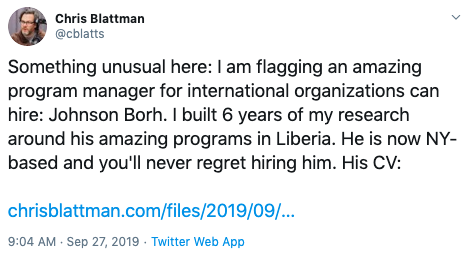Guest post by Jeff Mosenkis of Innovations for Poverty Action
First, a word from Chris (click the linked screenshot below for the whole interesting story):

Here’s that link to his CV (including a graduate degree from Columbia). But you can hear him and Chris on Freakonomics talk about the program he developed in Liberia.
- The American Economic Association released its full report on the professional climate survey it ran and it’s not good.
- Ben Casselman from The New York Times, who has done a lot of reporting on this, excerpts some of the more stunning responses.
- @itsafronomics points out the number of things black and Latina women report having had to do to avoid harassment or discrimination (such as giving up a job or other opportunity) is remarkably high – 4.4 compared to 1.5 for the average white male respondent.
- Brett Matsumoto points out that people with disabilities including mental health issues also reported being made to feel worse about it by their colleagues
- I was also surprised by the rates of religious discrimination experienced by Muslims (table 5D) – rates of 29-39%
- Mexico’s famously randomized Prospera (previously called Progresa and Oportunidades) national program designed to support the production of econ papers about conditional cash transfers, is being phased out. One of the arguments for getting rid of it was that it was poorly targeted (money ended up going not just to the poorest families). It will be replaced in part with a scholarship program, which I believe was evaluated and found not to be effective, in part because it was poorly targeted.
- In Why I Resigned From the Gates Foundation, Sabah Hamid explains the issues with the foundation presenting a personal award to Prime Minister Modi.
- The John Heinz Dissertation Award for dissertations about social insurance is accepting nominations until October 21.
- Rwanda’s gender quotas mandating seats for women in the legislature are often presented as a strong pro-woman policy, but it takes more than quotas to change culture (you may have to click “Read More”). Also see this episode of Invisibilia (audio or Apple/iTunes).
